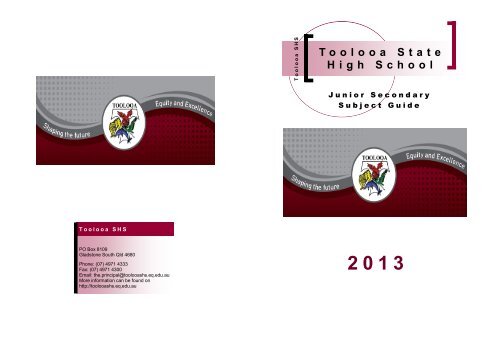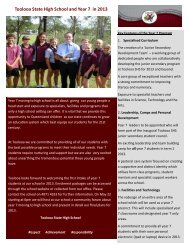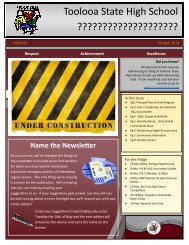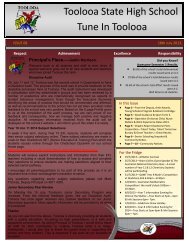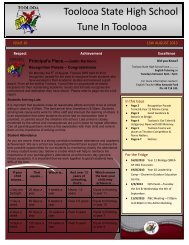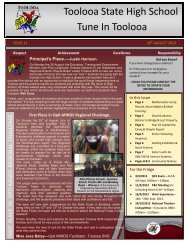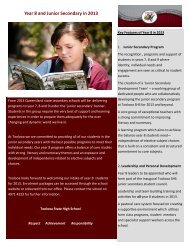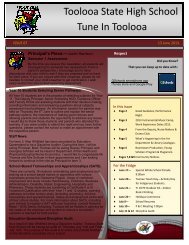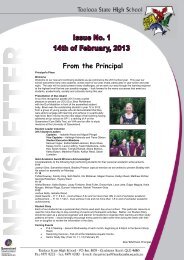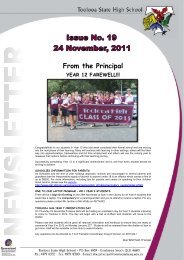junior-secondary-subject-guide - Toolooa State High School
junior-secondary-subject-guide - Toolooa State High School
junior-secondary-subject-guide - Toolooa State High School
Create successful ePaper yourself
Turn your PDF publications into a flip-book with our unique Google optimized e-Paper software.
T o o l o o a S H S<br />
T o o l o o a S t a t e<br />
H i g h S c h o o l<br />
J u n i o r S e c o n d a r y<br />
S u b j e c t G u i d e<br />
T o o l o o a S H S<br />
PO Box 8109<br />
Gladstone South Qld 4680<br />
Phone: (07) 4971 4333<br />
Fax: (07) 4971 4300<br />
Email: the.principal@toolooashs.eq.edu.au<br />
More information can be found on<br />
http://toolooashs.eq.edu.au<br />
2013
N o t e s a n d O t h e r I n f o r m a t i o n<br />
_______________________________________________<br />
_______________________________________________<br />
_______________________________________________<br />
_______________________________________________<br />
_______________________________________________<br />
_______________________________________________<br />
_______________________________________________<br />
_______________________________________________<br />
_______________________________________________<br />
_______________________________________________<br />
_______________________________________________<br />
_______________________________________________<br />
_______________________________________________<br />
“At <strong>Toolooa</strong> <strong>State</strong> <strong>High</strong> <strong>School</strong> we work with our students and community to develop the<br />
best personal learning outcomes for our students. Central to our core values is that, together,<br />
we are able to create a challenging learning environment for all students that<br />
caters for all and is based on academic excellence, quality vocational training and readiness<br />
for work or future study. Our belief is that our school is a significant contributor to<br />
preparing young people for their future success in life and, in doing so, adds to the construction<br />
of a strong and positive spirit in our community.‖<br />
—Alan Whitfield, Principal <strong>Toolooa</strong> <strong>State</strong> <strong>High</strong> <strong>School</strong><br />
Page 2 <strong>Toolooa</strong> SHS<br />
Page 15 <strong>Toolooa</strong> SHS
P A T H W A Y S T O S U C C E S S ( P 2 S )<br />
This <strong>subject</strong> is most suitable for students who need<br />
extra assistance with numeracy, literacy and organisational<br />
skills. Structured as an individual tutorial program,<br />
students will learn strategies, overcome barriers<br />
and develop self-confidence in achieving learning outcomes<br />
that will enhance their Pathways to Success.<br />
C O N T E N T S<br />
S c h o o l b e l i e f s a n d v a l u e s<br />
Page 4<br />
S U B J E C T O F F E R I N G S<br />
Business and Information Technology Department Page 6<br />
English/LOTE Department Page 7<br />
Mathematics Department Page 8<br />
Physical Education/Health Department Page 8<br />
Social Science Department Page 9<br />
Science Department Page 10<br />
The Arts Department Page 11<br />
Vocational Studies and Design Department Pages 13<br />
Pathways to Success Page 15<br />
Page 3<br />
Page 14 <strong>Toolooa</strong> SHS<br />
Page 3 <strong>Toolooa</strong> SHS
V a l u e s a n d B e l i e f s<br />
A t T o o l o o a w e v a l u e :<br />
The worth of every individual<br />
Equality of opportunity<br />
The spirit of co-operation<br />
Sincere effort<br />
The pursuit of excellence<br />
The desire to learn<br />
<strong>High</strong> ethical and moral behaviour<br />
I n d u s t r i a l W o r k s h o p<br />
S t u d i e s<br />
Students work on Woodworking, Woodturning,<br />
Plastics – (integrated with these are safety,<br />
project planning and design, workshop<br />
graphics, surface finishing). Units are project<br />
based – each project is considered to be one<br />
unit. Whole group demonstrations given, then<br />
students complete their own projects with<br />
individual help from teachers. There are<br />
theory components for each unit. Projects are<br />
marked at various stages.<br />
W i t h i n a p o s i t i v e , c a r i n g l e a r n i n g e n v i r o n -<br />
m e n t , w e b e l i e v e e a c h s t u d e n t h a s t h e o p -<br />
p o r t u n i t y t o :<br />
Enjoy learning<br />
Develop and maintain selfesteem<br />
Learn to respect the rights and<br />
opinions of others<br />
Prepare for vocational pursuits<br />
and lifelong learning<br />
Use relevant technology<br />
Develop mental and physical abilities<br />
to the fullest<br />
Develop an inquiring mind<br />
Contribute to the growth and development<br />
of the school community and<br />
Appreciate and protect the environment<br />
Learn to use leisure time effectively<br />
Students complete units on sheet metalwork,<br />
fitting and fabrication, metal turning, basic<br />
mechanics, basic electronics (integrated with<br />
these are safety, project planning and design,<br />
workshop graphics, surface finishing). Units<br />
are project based – each project is considered<br />
to be one unit. Whole group demonstrations<br />
given, then students complete their own<br />
projects with individual help from teachers.<br />
There are theory components for each unit.<br />
Projects are marked at various stages. Tests<br />
and practical units (projects) will use all three<br />
criteria.<br />
G r a p h i c s<br />
While the <strong>subject</strong> still retains many aspects of traditional<br />
Graphics, <strong>Toolooa</strong>‘s Graphics program has shifted with<br />
industry demands and is now primarily driven by<br />
Computer Aided Design (CAD) drawing. Students also<br />
cover plane geometry, orthographic projection, pictorial<br />
development, diagrams & charts and manual drafting<br />
using drawing boards and tee squares. Assessment<br />
consists of practical & theory tests after each unit of<br />
work, class work and homework.<br />
Page 4 <strong>Toolooa</strong> SHS<br />
Page 13 <strong>Toolooa</strong> SHS
D r a m a t i c M e d i a<br />
Elements of drama and media will be<br />
studied in this new <strong>subject</strong> for 2013. Along<br />
with skills and themes associated with<br />
drama and performance, students will be<br />
exposed to studies in media. Media takes<br />
students behind the scenes of the<br />
production of television, film, radio,<br />
internet and print media forms. They gain<br />
the skills necessary to be able to<br />
comprehend and understand how media<br />
manipulates images and sounds to create meaning.<br />
Dramatic media aims to build confidence and develop communication skills that<br />
are valuable life-skills. Students are provided with opportunities to work both<br />
independently and as part of a group.<br />
M u s i c<br />
The core components of music consist of aural musicianship, performing skills,<br />
listening skills and composing skills. Students are able to work at multigroup<br />
computer workstations (independent), or teacher-directed whole class activities,<br />
or performance using band instruments. Students are assessed on aural skills,<br />
aural analysis and visual analysis. Learning experiences in music develop skills<br />
that are transferable into everyday life.<br />
P r i n c i p l e s r e f l e c t e d i n o u r<br />
s u p p o r t i v e s c h o o l e n v i r o n m e n t :<br />
A consistent approach by the whole school community is required to develop<br />
a Supportive <strong>School</strong> Environment<br />
Appropriate behaviour is expected from all students<br />
The school has in place a Behaviour Management Policy which provides support<br />
for all students to allow them to achieve in a Supportive <strong>School</strong> Environment<br />
Our school environment can positively influence students‘ behaviour and performance<br />
A proactive approach is preferable to a reactive approach<br />
Encouraging appropriate behaviour is better than managing misbehaviour<br />
A safe and supportive school environment is guaranteed when members of<br />
the school community relate to one another with mutual respect and when<br />
everyone is committed to establishing a positive and caring environment<br />
M a n a g e m e n t P o l i c i e s o f T o o l o o a S H S :<br />
Keep Safe<br />
Keep Clean<br />
Anti-Smoking<br />
Attendance Procedures<br />
Excursion Procedures<br />
Jewellery & Uniform<br />
Assignment Policy<br />
Points System<br />
Reporting Procedures<br />
Communications Device Policy<br />
Page 12 <strong>Toolooa</strong> SHS<br />
Page 5 <strong>Toolooa</strong> SHS
Junior Secondary Subject Choices<br />
2013<br />
‘ R a i s i n g t h e B a r ’<br />
A major focus at <strong>Toolooa</strong> SHS is our belief in maximising the potential<br />
of each of our students. To that end, in our <strong>subject</strong>s, as well as maintaining<br />
high expectations, we provide extension opportunities where<br />
selected students work with extended curriculum to be challenged outside<br />
their regular year level content. As an example, students in Year 8<br />
Mathematics extension classes have been involved in Year 10 Trigonometry<br />
and Algebra topics, while students displaying a high level of skill in<br />
English have been involved in writing, publishing and selling books such<br />
as ‗Untold Stories of Gladstone‘ and ‗Hometown Heroes.‘<br />
V i s u a l A R T<br />
Visual art involves manipulating visual<br />
elements and processes to express<br />
ideas. Art consists of four major areas—<br />
painting, drawing, printing and<br />
sculpture. The structure of the course<br />
allows students to experiment in a<br />
range of art genres to develop their<br />
own style as an artist. The nature of the<br />
<strong>subject</strong> encourages students to explore<br />
a range of mediums and helps to<br />
develop creativity. Students are<br />
encouraged to display their work through opportunities provided by the Arts<br />
department such as Gallery exhibitions, showcase nights and the school<br />
musical.<br />
D a n c e<br />
The Dance course aims to foster an<br />
enthusiasm of dance as an individual<br />
and as a member of a group. Dance<br />
heightens awareness of, and develops<br />
respects for, the body and increases<br />
the quality of individual‘s physical well<br />
being. Students develop skills in<br />
choreography, performance and<br />
appreciation of a variety of dance<br />
genres to learn the history and<br />
functions of dance. Students are provided with opportunities to work both<br />
independently and as part of a group as they participate in practical dance<br />
techniques classes, dance workshops, view live performances, and work with<br />
community dancers, choreographers and artists. All tasks focus on<br />
Choreography, Performance or Appreciation using practical, written and oral<br />
instruments.<br />
Page 6 <strong>Toolooa</strong> SHS<br />
Page 11 <strong>Toolooa</strong> SHS
S t u d y o f S o c i e t y a n d t h e E n v i r o n m e n t<br />
SOSE , the Study of Society and the Environment ,<br />
centres on the way people interact with each other and<br />
the environment. The <strong>subject</strong> involves investigations of<br />
controversial and challenging issues and promotes<br />
critical thinking.<br />
Units include History, Culture and Identity, Geography,<br />
Democracy and Citizenship.<br />
Students are assessed using a variety of instruments<br />
including role-playing, design, orals, reports, stimulus<br />
response, examinations and extended writing.<br />
C o m p u t e r a n d B u s i n e s s S t u d i e s<br />
( C B S )<br />
Students operate in an IT and Business context, in practical<br />
lessons using computers and various types of computer<br />
software. Students work on keyboarding, wordprocessing,<br />
display skills, spreadsheets, databases, Power-<br />
Point. Assessment is completed via exams and in class<br />
assignments.<br />
SAMPLE TOPICS<br />
Business Ventures<br />
Advertising and Marketing<br />
Internet Awareness and Safety<br />
Computer Programming<br />
Creating Business Stationery<br />
MYOB - Computerised book keeping<br />
Multimedia<br />
Robotics<br />
English<br />
S c i e n c e<br />
General Science covers Life & Living, Natural &<br />
Processes Materials, Energy & Change, Earth &<br />
Beyond and Science & Society. There are theory<br />
and practical classes, with an emphasis on<br />
hands-on experiences and the day-to-day<br />
applications of Science. All students complete a<br />
core component and then sit for a test. Those<br />
obtaining satisfactory marks proceed to do<br />
extensions of the core. Those who are not yet<br />
satisfactory have an opportunity to upgrade their<br />
marks.<br />
2013 will see a continuation of Science programs as part of the National<br />
Curriculum roll out across all schools in Australia. Further information at<br />
www.australiancurriculum.edu.au.<br />
The focus for English in <strong>junior</strong><br />
<strong>secondary</strong> is consolidation of skills in<br />
the areas of language, literature and<br />
literacy. This is achieved through<br />
studies of various media texts, novels,<br />
and poems. Students respond to these<br />
texts in a variety of modes under a<br />
range of conditions. Grammar, spelling and reading for pleasure are valued as<br />
essential skills and time is allocated to develop these in the English program.<br />
2013 will see a continuation of English programs as part of the National<br />
Curriculum roll out across all schools in Australia. Further information on this<br />
can be found at www.australiancurriculum.edu.au.<br />
Page 10 <strong>Toolooa</strong> SHS<br />
Page 7 <strong>Toolooa</strong> SHS
J a p a n e s e<br />
Look at different aspects of Japanese<br />
language and culture – basics of writing,<br />
listening, speaking and reading. The course<br />
takes an holistic view of Japanese, also<br />
focusing on customs, food, social life etc.<br />
Students complete their course book and<br />
learn through guest speakers and excursions.<br />
Assessment is via exams in writing, speaking,<br />
reading, listening and other assignments in<br />
research areas.<br />
H e a l t h & P h y s i c a l E d u c a t i o n<br />
Students in the Junior school work<br />
through units on dance, large ball sports,<br />
athletics, gymnastics, small ball sports,<br />
full-body activities, sport-related fitness,<br />
health-r elat ed fitnes s, Human<br />
Relationship Education, outdoor ed., first<br />
aid, nutrition, sociology, sports science<br />
and physical recreation. Students select<br />
from a variety of sports each term. 50%<br />
prac. 50% theory. Practical work is<br />
assessed through skills, drills, game play,<br />
participation and co-operation.<br />
M a t h e m a t i c s<br />
In <strong>junior</strong> Mathematics, students cover a broad cross section of Mathematical<br />
topics with emphasis on topics, such as number study, space, chance & data,<br />
patterns & algebra and measurement. <strong>High</strong>er achievers are placed in extension<br />
classes who cover some levels of work more quickly, then spend more time on<br />
higher levels of work. Others are arranged in mixed groupings. Flexible<br />
interfacing between groups means Recovery classes may be formed if need<br />
arises for specific students who find Mathematics difficult. 2013 will see a<br />
continuation of Maths programs as<br />
part of the National Curriculum roll<br />
out across all schools in Australia.<br />
Further information on this can be<br />
f o u n d a t<br />
www.australiancurriculum.edu.au.<br />
H o m e E c o n o m i c s<br />
Two strands: Sewing – ―Creative Textiles‖ (Will run if sufficient numbers) Food<br />
Studies – 4 Modules ―Function Catering‖, ―Food Technology‖, ―Festivals and<br />
Celebrations‖, ―Towards Independence‖ The nature of these courses is<br />
weighted heavily toward a practical component with lessons completed in<br />
kitchen facilities.<br />
Page 8 <strong>Toolooa</strong> SHS<br />
Page 9 <strong>Toolooa</strong> SHS


